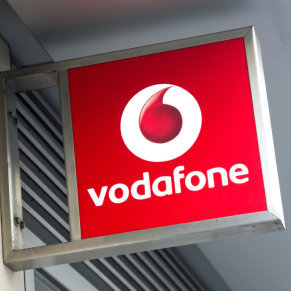
As touted turnarounds go, Vodafone's does not look to be the smoothest.
Yes, service revenues grew organically for the second quarter of its current fiscal year, after dipping in the first, and there was good progress on cost cutting. But net debts rocketed to €48.1 billion ($53 billion) at the end of September, from €32.1 billion ($35.4 billion) in March, and free cash flow nearly fizzled out entirely, falling to €34 million ($37 million) for the first half from €566 million ($623 million) a year earlier. Dividends were cut.
CEO Nick Read, nevertheless, said he was pleased to see Vodafone executing on its strategic priorities so rapidly. The good news included a very slight organic improvement of 0.3% in service revenues for the six months, with overall group revenues up 0.4% year-on-year, to €21.9 billion ($24.1 billion). Cost-cutting efforts delivered a 2.7% rise in adjusted earnings (before interest, tax, depreciation and amortization), to about €7.1 billion ($7.8 billion). A chatbot called TOBi now handles a fifth of customer queries, replacing human assistants in the process.
On the downside, net debt spiraled 50%, and there was a net loss of about €1.9 billion ($2.1 billion) for the six months. The takeover of Liberty Global businesses and heavy spending on 5G spectrum licenses were mainly to blame for the debt situation, which Standard & Poor's, a credit rating agency, flagged as a concern earlier this year. Vodafone now expects net debt to equal about three times earnings by the end of this fiscal year. It needs organic growth to help reduce that ratio to about 2.5 times earnings in the next few years, but will also look to sell non-core assets, it said today.
As for the net loss, that was largely the result of a clobbering in India, where authorities are demanding about $4 billion in unpaid licensing fees and other charges following a ruling by the country's Supreme Court. The potential collapse of Vodafone Idea -- the product of a merger between Vodafone's Indian business and local rival Idea Cellular -- has become a distinct possibility, despite Vodafone's denials that it is preparing to withdraw from the market.
Updates to Vodafone's outlook reflect the mixed fortunes. The operator is now guiding for adjusted earnings of €14.8 to €15 billion ($16.3 to $16.5 billion), up from a previous forecast of €13.8 to €14.2 billion ($15.2 to $15.6 billion). That is mainly because of the contribution Liberty Global is now expected to make. In free cash flow, Vodafone forecasts "around" €5.4 billion ($6 billion), having previously anticipated "at least" this amount.
Despite the difficulties, Vodafone insisted that its commercial and financial performance so far this year had been slightly ahead of expectations. It hailed "deepening customer engagement" with its rollout of new 5G services across seven markets. In Europe, the focus of 5G launch efforts, Vodafone gained nearly 700,000 subscribers in the second quarter, giving it more than 111,300 in September, after it had lost more than 300,000 in the first quarter. Yet semi-annual service revenues in Europe fell 1.6% on a like-for-like basis, compared with the year-earlier period. Fierce competition hit Vodafone's performance in Italy and Spain, where service revenues were down 3.5% and 8.7%, respectively.
Want to know more about 5G? Check out our dedicated 5G content channel here on
Light Reading.
At the savings level, Vodafone had concluded network-sharing agreements in five European markets before this month, and another deal with Deutsche Telekom and Telefónica was announced this week. Those deals should help slash the significant bill for the rollout of 5G services. Still, they raise a concern about Vodafone's ability to differentiate itself from the competition -- especially in markets like Italy, where it is sharing mobile equipment and not just physical sites.
Exacerbating that concern is a grand scheme to spin off towers into a separate company. That could be valued at more than $20 billion, CEO Nick Read has previously indicated, and would have its own management team looking after about 61,700 towers in ten European markets. Vodafone remains "on track" to make this new company fully operational by May 2020, said Read today, and it has already reached an agreement in Italy to set up a joint towers venture with Telecom Italia.
Some analysts, though, worry that a listing or partial divestment of the European towers business will result in a loss of control. Read has ruled out the sale of anything bar a minority stake in this holding company but has said he remains open to bigger disposals at a local level. "It comes down to whether there is a good supply of towers in a market," he said earlier this year. "Is control a strategic imperative, or is there lots of access to towers, in which case we may be open to a majority sale?"
Investors chose to look on the bright side today, with Vodafone's share price up 1.7% before lunchtime, to about 163 pence sterling. It is now up from a one-year low point of 124.28 on 13 May, easing pressure on Vodafone's boss. As he steers Vodafone toward his destination of a more efficient and profitable business, there is still plenty that could send it off the road.
Related posts:
— Iain Morris, International Editor, Light Reading
About the Author(s)
You May Also Like




_International_Software_Products.jpeg?width=300&auto=webp&quality=80&disable=upscale)







